Security Guards Duty for Arrest, Detention and Search

Security guards have specific powers to enforce rules set by property owners. However, security guards, whether licensed or not, cannot enforce various laws reserved for the police. A security guard’s primary role is to protect property. All property belongs to someone. Private property owners can make rules about the use of their property including rules about unwanted activities and behaviours. “No loitering”, “no shirt, no shoes, no service”, “washrooms for customer use only”, “no swearing”, ‘no pets allowed”, “no access allowed”, “no skate boarding” are typical examples or unwanted activities and behaviours.
Arrest
In Canada, security guards have no greater authority for arresting someone than an ordinary citizen. Security guards cannot make an arrest, unless it’s a citizen’s arrest. Nor can security guards detain someone against his/her will unless the person is under arrest. To make a citizen’s arrest, a guard must witness a criminal offence on or in relation to the property which they are authorized to protect (for example breaking and entering or vandalism). They may also make a citizen’s arrest if they see someone run from a person who has authority to make an arrest, such as a police officer.
Search
Security guards have no greater authority to search someone than an ordinary citizen. This means they cannot search someone without the person’s permission (informed consent) or unless they have conducted a citizen’s arrest. Informed consent means the person who gives permission knows the consequences of their decision. Informed consent can also be a requirement for gaining entry to a private event such as a rock concert or a sporting event. In the event of a citizen’s arrest, a search should be limited to a pat-down for weapons or for evidence that relates to the reason the person was arrested. If a security guard makes an arrest, they must:
- Identify themselves as a security professional
- Take physical custody of the person
- Inform the person that he or she is under arrest
- Tell the person why they are being arrested
- Inform the person that he or she has the right to legal advice
- Hand the person over to the police as soon after the arrest as possible.
Banning
A guard can ask a person to leave property and they can ban someone from property if rules are broken. When doing so, guards should be professional and indicate which rule is being broken. If someone refuses to leave property when asked, he/she may be viewed as a trespasser. Guards can use reasonable force to remove trespassers and they can make a citizen’s arrest if a trespasser actively resists lawful efforts to remove them. Under BC law, trespassing is defined as:
- entering someone else’s property
- engaging in prohibited activities on that property
- not leaving after being told to do so.
Detention
Security guards cannot hold someone against his/her will unless thT person is under arrest. If a guard suspects that a crime was committed and wants to ask questions, they have no power to keep the person on the premises.


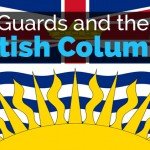
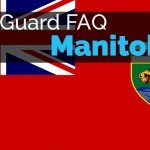
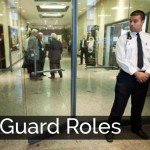
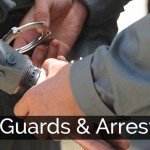
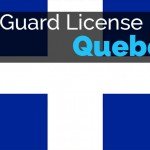
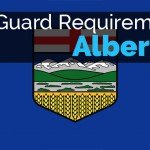
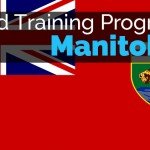
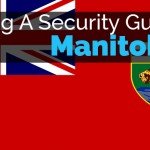
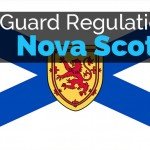
8 comments on Security Guards Duty for Arrest, Detention and Search
Kevin Orpen
Do security guards require certification to use handcuffs?
Mitch Z.
yes. its part of the training.
Brooklyn Martin
Of course, every security guard needs a proper training to handle various kinds of critical situations.
doug mac
If a security gard cannot hold a person against their will then why can they use hand cuffs.
If they cannot search a person then why do they do it
Guy Toderash
how is reasonable force defined for a security guard? obviously must be a different set of standards than police correct? Another video surfaced here of 2 walmart thugs taking down a woman. Theres a line here somewhere and the soliciitor general better start defining it and punishing offenders.
Mick McKee
In B.C., after a person has been told to leave a property after being instructed to do so by a security guard hired to protect that property, is the person refusing to leave committing the offence of assault by indirectly applying force (refusing to leave) on that security guard?
As I read the trespass act of B.C., only a police officer can actually arrest for trespassing.
John Kingsley
While at Nations Fresh Foods, in Jackson Square, 2 King Street West, Hamilton, Ontario, PH# 905-522-3501, on Wednesday, January 31st, at approximately 3:30 in the afternoon, I was looking for a cart, as the store is so large, I had decided to ask a male staff member where I could find the carts. I approached a cashiers stall and leaned against the metal railing, trying to get the clerks attention,, suddenly the clerks attention I was trying to get, turned quickly towards me and he tried pushing me aside while I asking him where they kept the shopping carts.
I don’t think he understood English, as that was an adverse reaction on the staff members part, When he laid his hands on me and shoved me, I instinctively brushed his arms off of me with my right arm, he then pushed by me and went his way, I also turned away, took my glasses out of my pocket and went to go about my business.
I was looking at items on a shelf behind were this altercation took place, when I was tackled from behind. I did not know who tackled me into the shelf and then to the ground, losing my glasses, until he stood me up, and then identified himself as security. I was then guided by the arm into a back room, where I was detained. There, there was talk of taking police action, but the security guard seemed concerned that if police became involved that the store clerk may in fact be the one getting charged.
At first the security guard claimed I struck the man, he then went out of the security room, when he came back, his story changed from I had struck the man, to the clerk had pushed me, and I had pushed back. I may have pushed back with my body, in the sense of keeping myself from falling and in the sense of removing his arms from me in a sweeping motion of my right arm, but I did not strike the man.
I am entering into my senior years and am a medical patient, with a Catheter sticking out of my body, with one tube going into my jugular vein in my neck and one into the vein that goes to my heart. I have difficulty in breathing due to water retention in my lungs and am severely under weight, I was also feeling very ill and weak that day.
When the security guard had tackled me, he was exerting pressure on my chest and mid section, which caused severe stomach upset and caused me to vomit after being released by security out the back door and onto Bay Street. I am hardly in any shape to be of any trouble to anyone or to resist. I am now also experiencing back pain due to this.
From what I had seen, the store has some really good prices, and I was looking forward to doing some shopping there. However due to this altercation, I was banned from shopping there for a few days, although now I am reconsidering ever going there to shop again. I am hoping that this incident was captured on the stores video and that there may be any witnesses that may come forward. However, I do not know how to go about retaining a copy of the security video.
I would suggest that anyone interested in shopping there avoid asking for help from the store clerks, as I discovered many of the staff, are not versed in English communications, which can lead to misunderstandings and other possible repercussions.
I would like to know what my rights are in a situation like this and what actions I may take regarding this?
RODNEY MOCKLER
No there are NOT permitted to use handcuffs EVER. Even if training by there security “Schooling”, this is a means of false licensing and does not follow the Charter and Human Rights in Canada. The government will not extend or give the rights to citizens to carry a weapon or handcuffs or even detainment more than you or I do. This is a serious issue. Citizen’s arrest and that is it!!!!!